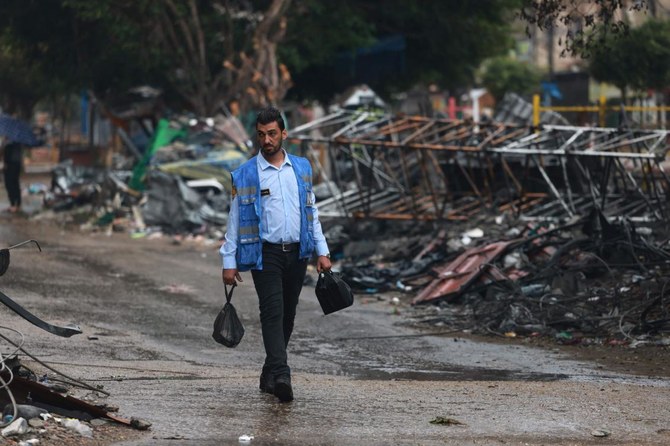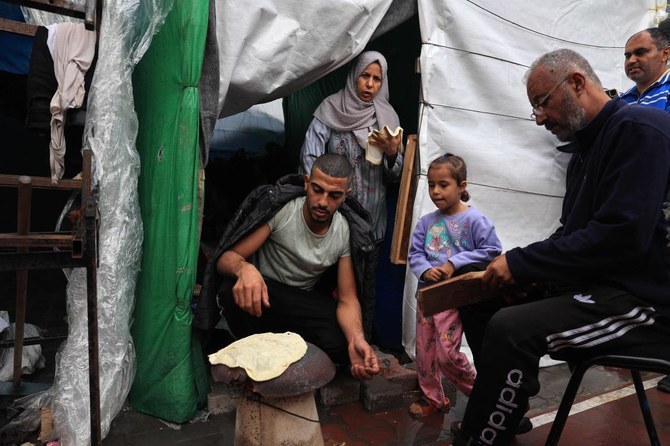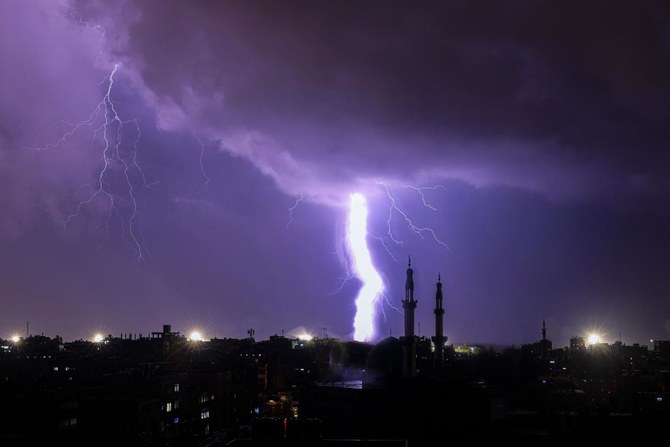RAFAH, Palestinian Territories: When Khulud Jarboueh and her children fled their home in the northern Gaza Strip under Israeli bombardment in early October, the young ones were wearing just shorts and T-shirts.
The heat of late summer still lingered then. But now she rummages through piles of clothing looking for something to keep them warm in the rain and bitter cold.
“We left Gaza City with 20 members of the family more than a month ago,” the 29-year-old told AFP at a second-hand clothes stall outside a school in Rafah run by the UN agency for Palestinian refugees (UNRWA).
They had left the north of the Palestinian territory after Israel warned people to flee south, saying it was safer there.
The exodus came after Israel’s military began a relentless bombardment of Gaza after Hamas militants stormed across the border on October 7 and killed around 1,200 people, mostly civilians.
They also seized around 240 hostages in attacks that sparked massive retaliation from Israel. The Hamas government in Gaza says Israeli attacks have killed around 11,500 people, including thousands of children.
Now Jarboueh and her family sleep on the floor of the UNRWA school.
“We didn’t take any clothes with us. But now it’s cold and I have to buy winter stuff,” she said at the stall where items of clothing go for a shekel each (around $0.25).
Even before the war, life in the Gaza Strip was difficult.
The United Nations estimates that in 2022, the blockade Israel had enforced against the territory since 2007 had “hollowed out Gaza’s economy.”
“The restrictions on movement also impede access to health and other essential services, as 80 percent of Gazans depend on international aid,” said UNCTAD, the UN Conference on Trade and Development.
Unemployment in the densely populated strip of land squeezed between Israel, Egypt and the Mediterranean Sea was 45 percent.
Today, the UN says, all 2.4 million people in Gaza are going hungry, and 1.65 million have been displaced by the war. With almost half the houses in Gaza destroyed or damaged, poverty will only get worse.
“It’s the first time in my life I’ve had to buy second-hand clothes,” said Jarboueh. “We’re not rich, but I can usually afford to pay 10 shekels for an item of clothing for the children.
“Now they’re coughing because it’s so cold. I have no other choice.”
She said she was sure the old clothes were “full of germs.”
“But they’re going to have to put them straight on. I don’t have the water to shower my children, let alone do the laundry.”
On a road lined with stalls, hundreds of Palestinians held up items to check sizes or compare fabrics. The temperature has now dropped and downpours are common.
Farmer Walid Sbeh said he has been uprooted from his land, and does not have a shekel to his name. He camps at the UNRWA school each night with his wife and 13 children.
“I can’t stand it, seeing my children still in their summer clothes go hungry, and I know I can’t buy them anything,” he told AFP.
“This is no life. They force us from our homes and kill us in cold blood. If we don’t die in the bombing we die of hunger or thirst, sickness and cold,” he said.
Sbeh said that when they left after their house was bombed they brought blankets with them.
“But on the road, the Israeli soldiers told us to drop everything and keep our hands up.”
He said some people gave them warmer clothing their own children had outgrown.
Adel Harzallah, who runs a clothes shop, said his stock of winter pyjamas sold out in two days.
“The war began when we were waiting for winter wear to arrive. It was due to come across the border” but that shut after the October 7 attacks in Israel.
Now his goods were stuck in containers, like food, drinking water and fuel, all only to be released for a high price.
One potential customer left Harzallah’s store disappointed.
“Seventy shekels for a jacket? I can’t pay that — I’ve got five kids,” she said.
Abdelnasser Abu Dia, 27, told AFP he “doesn’t have enough to buy bread, let alone clothes.”
For a month he had only the clothes in which he fled.
But as the temperature dropped, “someone gave me and my kids sportswear jackets. We’ve been wearing them non-stop for a week.”
Displaced Gazans search for warm clothes as cold draws in
https://arab.news/jjxp7
Displaced Gazans search for warm clothes as cold draws in

- The exodus came after Israel’s military began a relentless bombardment of Gaza
- Even before the war, life in the Gaza Strip was difficult
Arab world, Middle East condemn Israel’s attacks against Israel

DUBAI: The Arab world has responded to Israel’s strikes against Iran, each country offering its condemnation of the attacks that killed at least two top military officers, raising the potential for an all-out war between the two bitter Middle East adversaries.
The UAE, through its foreign affairs ministry, stressed the importance of “exercising the utmost self-restraint and judgment to mitigate risks and prevent the expansion of the conflict.”
“Enhancing dialogue, adhering to international law, and respecting the sovereignty of states constitute essential principles for resolving the current crises,” the foreign affairs ministry added.
The UAE emphasized the need to resolve disputes through diplomatic means rather than confrontation and escalation, and called on the United Nations Security Council to take urgent and necessary measures to achieve a ceasefire, and to reinforce international peace and security.
Oman offered its “strong condemnation of the brutal military aggression launched by Israel on the territory of the Islamic Republic of Iran, which targeted sovereign facilities and caused casualties.”
“Oman considers this action a dangerous and reckless escalation that constitutes a flagrant violation of the United Nations Charter and the principles of international law. It also represents unacceptable and ongoing aggressive behavior that undermines the foundations of stability in the region,” the country’s foreign affairs ministry said.
And Jordan’s foreign ministry spokesperson Sufian Qudah warned of the “consequences of such escalatory actions, saying they threatened regional security and stability and risk exacerbating tensions”, state news agency Petra reported.
Elsewhere Qatar said it “considers the assault a blatant violation of Iran’s sovereignty and security, as well as a clear breach of international law and its established principles,” state news agency QNA meanwhile reported.
“The State of Qatar voices its grave concern over this dangerous escalation, which forms part of a recurring pattern of aggressive policies that threaten regional peace and stability and hinder efforts aimed at de-escalation and diplomatic resolution.”
Qatar emphasized “the urgent need for the international community to assume its legal and moral responsibilities and to act swiftly to halt these Israeli violations.”
“The State of Qatar reaffirms its firm position in rejecting all forms of violence, and reiterates its call for restraint and the avoidance of escalation that could widen the scope of conflict and undermine regional security and stability,” QNA reported.
Turkiye also condemned “in the strongest terms” Israel’s air strike on Iran, calling it a provocation that violates international law and risks further escalation in the region.
The Turkish foreign ministry in a statement said the attack showed Israel “does not want issues to be resolved through diplomatic means” and urged it to halt “aggressive actions that could lead to greater conflicts.”
Jassim Mohammed Al-Budaiwi, Secretary-General of the Gulf Cooperation Council (GCC), also described the Israeli attacks as a ‘clear violation of international law and the United Nations Charter.’
Al-Budaiwi, in a statement, called on the ‘international community and the Security Council to assume their responsibilities towards immediately halting this aggression and avoiding escalation that could ignite a wider conflict, which would have dire consequences for regional and international peace.’
Iran ‘must make a deal, before there is nothing left’: Trump

- Trump earlier told Fox News he was aware Israel was going to conduct strikes on Iran before it happened
- Secretary of State Marco Rubio said earlier Thursday that the United States was “not involved in strikes against Iran and our top priority is protecting American forces in the region”
WASHINGTON: US President Donald Trump urged Iran on Friday to “make a deal,” warning that there will be more “death and destruction” after Israel launched deadly strikes targeting Iranian nuclear facilities.
“There has already been great death and destruction, but there is still time to make this slaughter, with the next already planned attacks being even more brutal, come to an end,” Trump said on his Truth Social platform.
“Iran must make a deal, before there is nothing left... JUST DO IT, BEFORE IT IS TOO LATE,” he said.
Trump earlier told Fox News he was aware Israel was going to conduct strikes on Iran before it happened, and stressed that Tehran “cannot have a nuclear bomb,” according to the US broadcaster.
His comments to Fox came after Israel pounded Iran in a series of air raids on Friday, striking 100 targets including nuclear and military sites.
Israeli Prime Minister Benjamin Netanyahu said the operation took aim at the atomic facility in Natanz, while Iranian media said the country’s Revolutionary Guards leader Hossein Salami and armed forces Chief of Staff Mohammad Bagheri were killed.
Trump told Fox News that he was made aware of Israel’s operation before it happened.
“Iran cannot have a nuclear bomb and we are hoping to get back to the negotiating table. We will see,” Trump said, according to Fox News.
Fox News also reported that “Trump noted the US is ready to defend itself and Israel if Iran retaliates.”
It added that Trump’s administration reached out to at least one key Middle Eastern ally to acknowledge that the strike was going to happen, but reiterated that the US was not involved.
Secretary of State Marco Rubio said earlier Thursday that the United States was “not involved in strikes against Iran and our top priority is protecting American forces in the region.”
“Let me be clear: Iran should not target US interests or personnel.”
Trump will be attending a National Security Council meeting Friday morning.
UN nuclear watchdog chief ready to travel to Iran to assess situation

VIENNA: UN nuclear watchdog chief Rafael Grossi said on Friday he was ready to travel to Iran to assess the situation there after Israel carried out widespread military strikes that hit the sprawling nuclear complex at Natanz.
In a statement to a meeting of the International Atomic Energy Agency’s Board of Governors, Grossi said the other main enrichment center in Iran, Fordow, was not hit and neither was another nuclear facility in Esfahan, citing Iranian authorities.
There are no elevated radiation levels at Natanz, he added.
“I call on all parties to exercise maximum restraint to avoid further escalation. I reiterate that any military action that jeopardizes the safety and security of nuclear facilities risks grave consequences for the people of Iran, the region, and beyond,” Grossi said in his statement.
“I have indicated to the respective authorities my readiness to travel at the earliest to assess the situation and ensure safety, security and non-proliferation in Iran.”
He did not say what the extent of the damage at Natanz was or what parts of the site were hit. The site includes a vast underground uranium enrichment plant and a smaller, above-ground pilot enrichment plant.
Iran is enriching to up to 60 percent purity, close to the roughly 90 percent of weapons grade, at the pilot plant, but it is producing smaller quantities of that material there than at Fordow, a site dug into a mountain that military experts have said would be difficult for Israel to destroy through bombardment.
“Despite the current military actions and heightened tensions, it is clear that the only sustainable path forward – for Iran, for Israel, the entire region, and the international community – is one grounded in dialogue and diplomacy to ensure peace, stability, and cooperation,” Grossi said.
Jordan closes airspace, says it won’t be battleground for any conflict

DUBAI: Jordan has not and will not allow any violation of its airspace, nor will it be a battleground for any conflict, a senior minister said in a statement on Friday.
“Jordan’s national security is a red line, and the Kingdom will not allow any attempt to threaten its security and the safety of its citizens,” Mohammad Momani, Minister of Government Communication and Government Spokesperson added.
Royal Jordanian Air Force aircraft and air defense systems intercepted a number of missiles and drones that entered Jordanian airspace Friday morning, a report from state news agency Petra stated.
The interception operation came in response to military assessments that missiles and drones were bound to fall into Jordanian territory, including populated areas, which could cause casualties, Petra added.
Momani also urged the international community to exercise pressure in order to restore calm and prevent further escalation in the region.
Jordan’s aviation authority closed the country’s airspace and grounded all flights after Israel attacked Iran.
“The Kingdom’s airspace is temporarily closed, and air traffic suspended for all aircraft – incoming, outgoing and in transit, as a precaution against any risks resulting from the regional escalation,” the authority said in a statement.
The country’s armed forces were also placed on high alert in response to growing regional tensions, a military source said.
The General Command was closely monitoring developments in the region and that the armed forces were at the highest levels of operational and logistical readiness to respond any potential emergencies, the Petra report noted.
After Israel strikes Iran, airlines divert flights, airspace closed

- Iranian airspace has been closed until further notice, state media reported
- Six commercial aircraft have been shot down unintentionally and three nearly missed since 2001, according to aviation risk consultancy Osprey Flight Solutions
SEOUL: Airlines cleared out of the airspace over Israel, Iran and Iraq early on Friday after Israel launched attacks on targets in Iran, Flightradar24 data showed, with carriers scrambling to divert and cancel flights to keep passengers and crew safe.
Proliferating conflict zones around the world are becoming an increasing burden on airline operations and profitability, and more of a safety concern.
Six commercial aircraft have been shot down unintentionally and three nearly missed since 2001, according to aviation risk consultancy Osprey Flight Solutions.
Israel on Friday said it targeted Iran’s nuclear facilities, ballistic missile factories and military commanders at the start of what it warned would be a prolonged operation to prevent Tehran from building an atomic weapon.
Tel Aviv’s Ben Gurion Airport was closed until further notice, and Israel’s air defense units stood at high alert for possible retaliatory strikes from Iran.
Israeli flag carrier El Al Airlines said it had suspended flights to and from Israel.
Iranian airspace has been closed until further notice, state media reported. Jordan also closed its airspace to all flights.
Abu Dhabi’s Zayed International Airport said on its social media account that flight disruptions were expected and passengers were ‘advised to check with their airline for the latest status of their flights before travelling to the airport.’
Dubai’s Emirates Airline cancelled its Iraq, Jordan, Lebanon and Iran flights on Friday. Qatar Airways also cancelled flights to and from Iraq and Iran.
Wizz Air Abu Dhabi also cancelled a number of flights on Friday that were scheduled to fly over areas affected by regional tensions in the Middle East. Abu Dhabi’s Etihad Airways said it is experiencing disruption to several services across the region due to airspace closures and the ongoing regional situation.
Turkish Airlines subsidiary AJet has cancelled flights to Iran, Iraq and Jordan until Monday morning following Israel’s attack on Iran, an AJet source said on Friday.
Greece’s Aegean Airlines has cancelled all flights to and from Tel Aviv scheduled for Friday, it said on its website.
Dutch airline KLM has cancelled all flights to Tel Aviv until at least July 1.
Russia’s Aeroflot cancelled flights between Moscow and Tehran, and made changes to other routes in the Middle East.
As reports of strikes on Iran emerged, a number of commercial flights by airlines including Emirates, Lufthansa and Air India were flying over Iran.
Emirates, Lufthansa and Air India did not immediately respond to requests for comment.
Iraq early on Friday closed its airspace and suspended all traffic at its airports, Iraqi state media reported.
Eastern Iraq near the border with Iran contains one of the world’s busiest air corridors, with dozens of flights crossing between Europe and the Gulf, many on routes from Asia to Europe, at any one moment.
Flights steadily diverted over Central Asia or Saudi Arabia, flight tracking data showed.
“The situation is still emerging — operators should use a high degree of caution in the region at this time,” according to Safe Airspace, a website run by OPSGROUP, a membership-based organization that shares flight risk information.
Several flights due to land in Dubai were diverted early on Friday. An Emirates flight from Manchester to Dubai was diverted to Istanbul and a flydubai flight from Belgrade diverted to Yerevan, Armenia.
Budget carrier flydubai said it had suspended flights to Amman, Beirut, Damascus, Iran and Israel and a number of other flights had been canceled, rerouted or returned to their departure airports.
The Israeli-Palestinian conflict in the Middle East since October 2023 led to commercial aviation sharing the skies with short-notice barrages of drones and missiles across major flight paths – some of which were reportedly close enough to be seen by pilots and passengers.
Last year, planes were shot down by weaponry in Kazakhstan and in Sudan. These incidents followed the high-profile downing of Malaysia Airlines flight MH17 over eastern Ukraine in 2014 and of Ukraine International Airlines flight PS752 en route from Tehran in 2020.

























